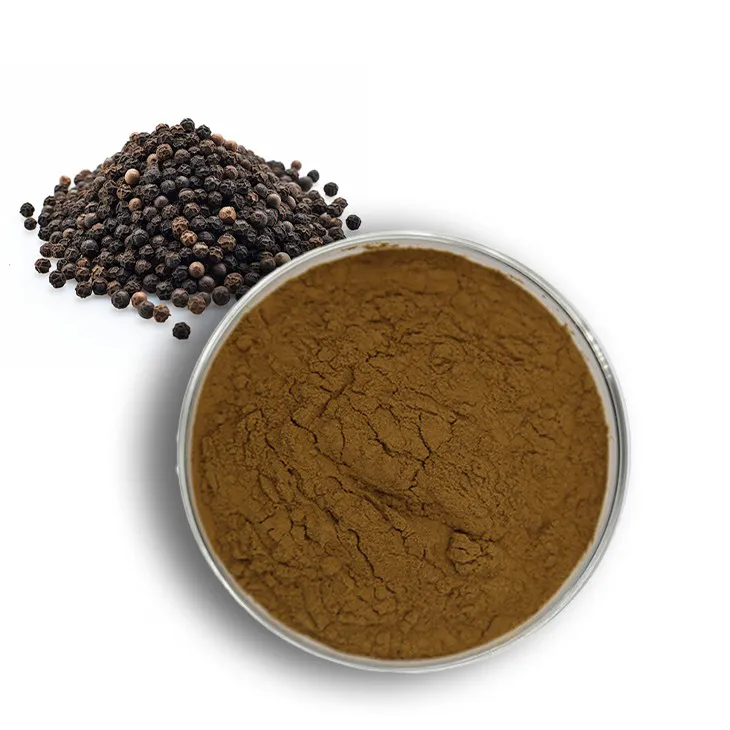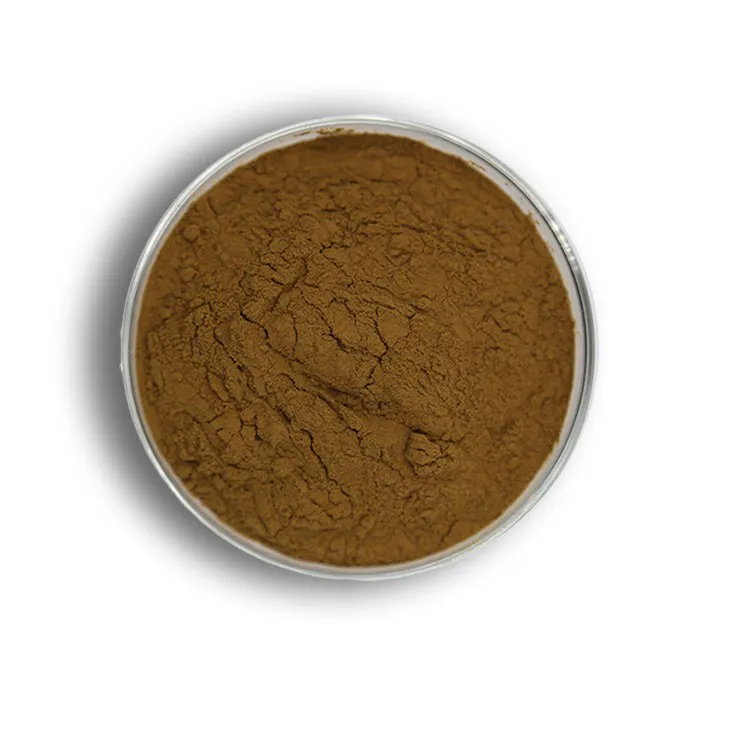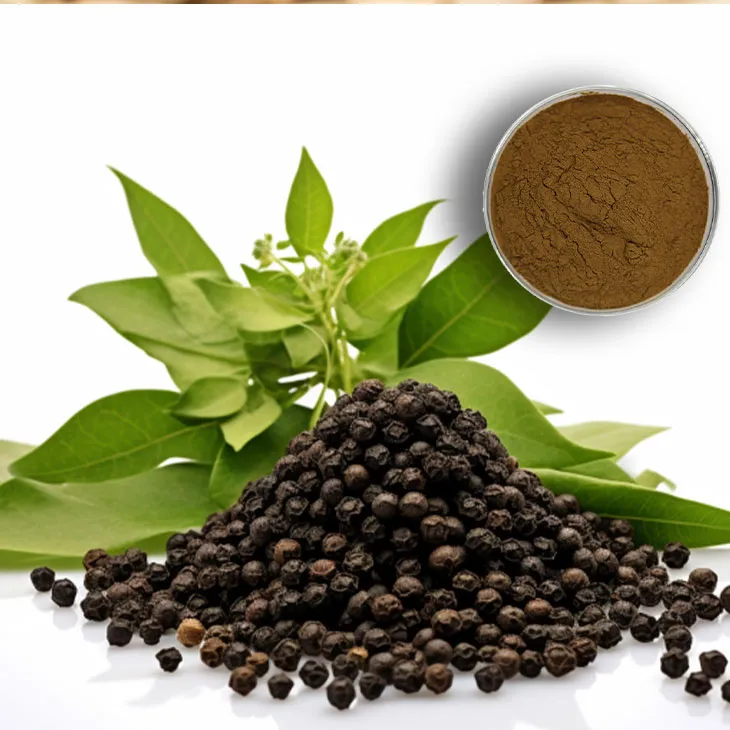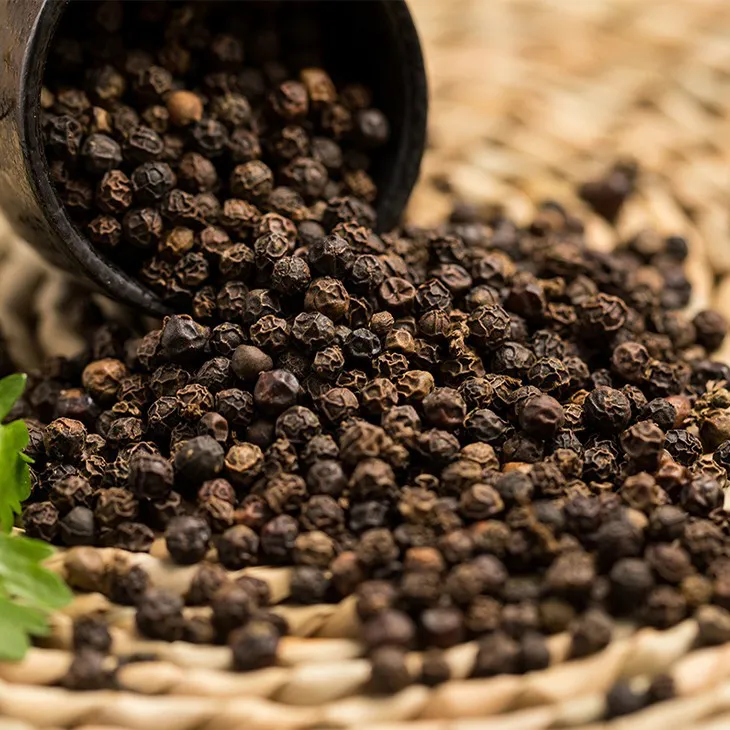- 0086-571-85302990
- sales@greenskybio.com
What is Black Pepper Extract? Definition, Types, History and Nutritional Value.
2024-12-18

1. Definition of Black Pepper Extract
Black Pepper Extract is a substance that is obtained through a series of specialized extraction processes from black pepper. Black pepper, known scientifically as Piper nigrum, is a well - known spice that has been used for centuries in cooking and traditional medicine. The extract aims to capture and concentrate the key elements present in black pepper.
The extraction process typically involves using solvents or other methods to isolate the desired compounds from the whole black pepper. These can include volatile oils, alkaloids, and other bioactive substances. By creating the extract, it becomes possible to use the beneficial properties of black pepper in a more concentrated and targeted way, for example, in the development of dietary supplements, pharmaceuticals, or in the food and beverage industry.

2. Types of Black Pepper Extract
2.1 Pure Piperine Extracts
Piperine is one of the most important and well - studied components in black pepper. Pure piperine extracts are created with the specific aim of isolating this compound. Piperine has been associated with several health - related functions.
For example, it has been shown to enhance the bioavailability of certain nutrients. When consumed along with other substances, such as Curcumin from turmeric, piperine can help the body absorb Curcumin more effectively. This is due to its ability to influence the body's metabolic processes related to absorption and transport of substances across cell membranes.
2.2 Complex Extracts
These extracts contain a mixture of volatile and non - volatile compounds from black pepper. The volatile compounds are often responsible for the characteristic aroma of black pepper. They include substances like terpenes and sesquiterpenes which give black pepper its unique smell.
The non - volatile compounds, in addition to piperine, may include other alkaloids and phenolic compounds. These complex extracts are often used in the food industry to add both flavor and potentially some of the health - promoting properties of black pepper to products. For example, in some gourmet food products or in certain herbal teas where a more complete black pepper flavor and a broader range of potential health benefits are desired.

3. History of Black Pepper and Its Extract
Black pepper has an extremely long and fascinating history.
3.1 Ancient Times
Black pepper was a highly prized luxury item in the Roman Empire. It was not only used in cooking but also as a form of currency in some cases. In other ancient cultures such as in India, black pepper has been used for thousands of years in traditional Ayurvedic medicine.
The ancient trade routes, such as the Silk Road, played a crucial role in the spread of black pepper from its native regions in South Asia to the rest of the world. It was in high demand in the Mediterranean region, where it was used to flavor a variety of dishes and also in some medicinal preparations.
3.2 Development of Extraction Technology
Initially, black pepper was mainly used in its whole or ground form. However, as technology evolved, the concept of extracting its key components emerged.
With the development of basic chemical processes in the Middle Ages and later, simple extraction methods started to be explored. As scientific knowledge and technology continued to progress, more sophisticated extraction methods were developed. These allowed for the isolation of specific compounds from black pepper, leading to the creation of black pepper extract as we know it today.
In modern times, with the growth of the dietary supplement industry and the increasing interest in natural products for health purposes, the production and use of black pepper extract have become more widespread and refined.

4. Nutritional Value of Black Pepper Extract
The black pepper extract is rich in various components that contribute to its nutritional value.
4.1 Piperine and Nutrient Absorption
As mentioned earlier, piperine is a key component. One of its most notable functions is in relation to the better utilization of other nutrients. For instance, it has been found to increase the bioavailability of vitamins and minerals.
Studies have shown that when piperine is present, the body can absorb nutrients like iron, selenium, and beta - carotene more efficiently. This is especially important for individuals who may have dietary deficiencies or those who rely on plant - based sources of nutrients, as some plant - based nutrients can be less bioavailable without the help of substances like piperine.
4.2 Antibacterial Properties
The extract may also possess antibacterial properties. Some of the compounds in black pepper extract, including piperine and other phenolic compounds, have been shown to inhibit the growth of certain bacteria.
This antibacterial activity can be beneficial in several ways. In the food industry, it can potentially help in the preservation of food products, reducing the need for synthetic preservatives. In a medical or health context, it may play a role in combating certain bacterial infections, although more research is needed to fully understand its potential in this area.
4.3 Metabolic Stimulation
Black pepper extract can also stimulate the body's metabolic processes. Piperine has been shown to influence thermogenesis, which is the process by which the body generates heat and burns calories.
By increasing thermogenesis, it may potentially contribute to weight management. Additionally, it can also affect other aspects of metabolism such as the regulation of blood sugar levels. However, it should be noted that while these properties show promise, they should not be considered as a sole solution for weight loss or metabolic disorders, but rather as part of a comprehensive approach to health.

5. Conclusion
Black pepper extract is a multi - faceted substance with a rich history and significant nutritional value. Its different types offer a range of potential applications, from enhancing nutrient absorption to providing antibacterial effects and influencing metabolic processes. As research continues to unfold, we can expect to see even more uses and benefits of black pepper extract in various fields such as food, medicine, and health.
FAQ:
What are the main extraction methods for black pepper extract?
Common extraction methods include solvent extraction, where solvents are used to dissolve the desired components from black pepper. Another method is supercritical fluid extraction, which uses a supercritical fluid (such as carbon dioxide) under specific conditions to extract the key elements of black pepper.
How can the purity of black pepper extract be determined?
There are several ways to determine the purity. One can use analytical techniques like chromatography (such as high - performance liquid chromatography, HPLC). Spectroscopic methods like infrared spectroscopy can also be used to analyze the composition and thus determine the purity of the black pepper extract.
Are there any side effects of consuming black pepper extract?
In large amounts, black pepper extract may cause some digestive discomfort, such as stomach irritation. Also, since it can affect the way the body absorbs certain medications, it may interact with some drugs. However, when consumed in moderation as part of a normal diet, it is generally considered safe for most people.
Can black pepper extract be used in skincare?
Yes, it can be. Some of its antibacterial and antioxidant properties may potentially be beneficial for the skin. For example, it may help in fighting acne - causing bacteria and reducing oxidative stress on the skin. However, more research is needed to fully understand its effectiveness and safety in skincare applications.
How is black pepper extract different from black pepper powder?
Black pepper powder is the whole ground form of black pepper, containing all the components in their natural proportions. Black pepper extract, on the other hand, is a concentrated form that has been processed to isolate specific components. The extract may have a more targeted effect due to the higher concentration of certain active ingredients, while black pepper powder provides a more general flavor and a broader range of components in smaller concentrations.
Related literature
- The Chemistry and Bioactivity of Black Pepper (Piper nigrum L.)"
- "Black Pepper Extract: A Review of Its Composition, Health Benefits, and Applications"
- "Nutritional and Medicinal Properties of Black Pepper and Its Extracts"
- ▶ Hesperidin
- ▶ Citrus Bioflavonoids
- ▶ Plant Extract
- ▶ lycopene
- ▶ Diosmin
- ▶ Grape seed extract
- ▶ Sea buckthorn Juice Powder
- ▶ Fruit Juice Powder
- ▶ Hops Extract
- ▶ Artichoke Extract
- ▶ Mushroom extract
- ▶ Astaxanthin
- ▶ Green Tea Extract
- ▶ Curcumin
- ▶ Horse Chestnut Extract
- ▶ Other Product
- ▶ Boswellia Serrata Extract
- ▶ Resveratrol
- ▶ Marigold Extract
- ▶ Grape Leaf Extract
- ▶ New Product
- ▶ Aminolevulinic acid
- ▶ Cranberry Extract
- ▶ Red Yeast Rice
- ▶ Red Wine Extract
-
Bamboo Leaf extract
2024-12-18
-
Curcumin
2024-12-18
-
Angelica sinensis extract
2024-12-18
-
Chia Seed Powder
2024-12-18
-
Red Vine Extract
2024-12-18
-
Aguaje Extract
2024-12-18
-
Red Wine Extract
2024-12-18
-
Milk Thistle Extract
2024-12-18
-
Cranberry Extract
2024-12-18
-
Berberis aristata Extract
2024-12-18





















